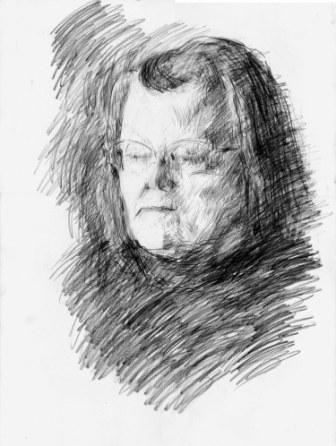The problem of using “their” with a singular noun to avoid the sexist “his” is acute, but why should it be? English, as we are always being told, is a flexible language, not given to unbreakable rules; English is living, breathing. Whether using non-sexist language will help women in the long run, I am not sure: human kind for mankind, for example. Did using mankind give me subconsciously the idea that I wasn’t as good as a man? Who knows, since it was subconscious. The words to “Dear Lord and Father of mankind, forgive my foolish ways” has been changed in our hymnal to avoid mankind. Will that help anyone?
The revolution is in full swing, however, and unstoppable, so couldn’t we say, Let’s scrap the necessity of making the singular/singular agreement. “A writer makes their choice” does sound wrong to me, but it is better than “A writer makes his/her choice.” Anyway, I am old and set in my ways, and I can well imagine that the construction will sound just fine to my grandchildren. I could revise the sentence to avoid using either construction, but that means that a whole valuable formation is lost.
When I discussed “which” and “that”, I got a comment leading me to a great post about the subject. The writer of the post is railing at a copy editor’s corrections of his manuscript. To prove his point that the editor is wrong about “which”, he quotes some great writers. The difficulty for me is that the works he cites are novels. Is “good usage” for novels different from “good usage” of non-fiction?
Yesterday Anecdotal Evidence had a great post about diagramming sentences. I loved diagramming sentences, and it has been of immense help to me. I learned the practice in freshman English in high school, while at the same time taking Latin. My writing style is serviceable, not the oratorical Henry James style I so admire or the subtle and brilliant Jane Austen style I wish I could emulate. Lucidity is necessary in a serviceable style.
Thursday, January 11, 2007
Subscribe to:
Post Comments (Atom)

1 comment:
This post makes me think of so many things about English. In particular hypercorrectionism. I hold that above all, a communication should strive to be as clear and complete as possible. Recently, I was noticing how Hemingway would use 'dislike' in his narration - yet 'don't like' in his reported speech. Anyhow, lots to this subject. For example, if I think that 'husband' comes from Norse, for 'master of the house' or 'one who controls;' is it still an appropriate noun for one's spouse? Hearing 'men and women of the Armed Forces' during the TV news makes me cringe, when there are many individual nouns for 'men and women.' Although I hold that some communications should also be as concise as possible, it is tenet - not a law.
Post a Comment